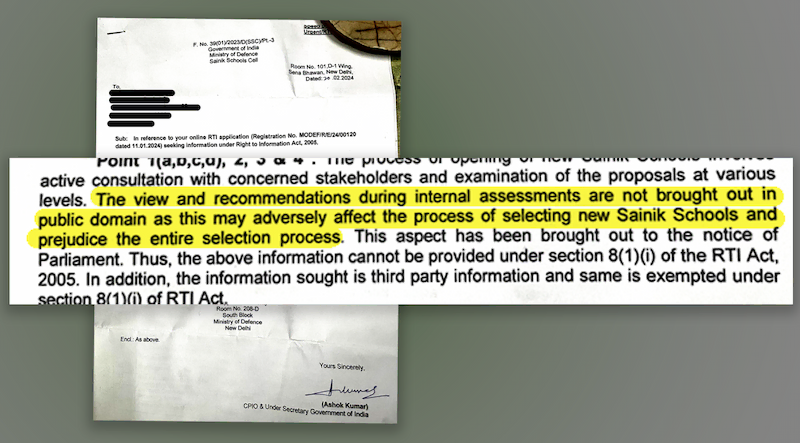Defence Ministry rejects report Claiming New Sainik Schools Allocated to BJP-RSS
Sainik School News: Responding to recent upheaval in media about alleged reports that 60% of new Sainik Schools are deliberately allotted to school promoters with BJP-RSS links, Defence Ministry has issued statement that all these claims are baseless & a transparent process was followed for new Sainik School allotment.

Alleging Congress (INC) party recently posted on its twitter handle that
मोदी सरकार ने देश के 62% नए सैनिक स्कूलों को BJP-RSS के नेताओं और BJP के करीबी सहयोगियों को सौंप दिया है। यह साफ तौर से सेना के ‘साम्प्रदायीकरण’ और ‘राजनीतिकरण’ की साजिश है। ये सेना में RSS की नफ़रत भरी विचारधारा को स्थापित करने की साजिश है। देश के सैनिक स्कूलों को BJP-RSS से जुड़े जिन लोगों को सौंपा गया है, उनकी लिस्ट देखिए
👉 पेमा खांडू (अरुणाचल के मुख्यमंत्री)
👉 BJP नेता साध्वी ऋतंभरा (यूपी)
👉 BJP विधायक सरिता भदौरिया (यूपी)
👉 BJP विधायक महंत बालकनाथ योगी (राजस्थान)
👉 BJP नेता राधाकृष्ण विखे पाटिल (महाराष्ट्र)
👉 BJP नेता हरिराम रणवा (राजस्थान)
👉 पूर्व मंत्री सदाभाऊ खोत (महाराष्ट्र)
👉 BJP विधायक संजय पाठक की पत्नी निधि पाठक (मध्य प्रदेश)
👉 पूर्व BJP महासचिव अशोककुमार भावसंगभाई चौधरी (गुजरात)
👉 BJP विधायक व विधानसभा स्पीकर शंकर चौधरी (गुजरात)
मोदी सरकार को ऐसी हरकतों से बाज आना चाहिए। देश सेना के साथ यह खिलवाड़ बर्दाश्त नहीं करेगा।
Response by Ministry of Defence on this matter
Articles have appeared in certain sections of the Press insinuating that New Sainik Schools are being allocated to institutions based on their political or ideological affiliations. Such insinuations are unfounded. Sainik Schools were established in the 1960s under the Sainik Schools Society (MoD).
Considering the significant success of the existing 33 Sainik Schools, there has been a continual demand for additional Sainik Schools in the country. New Sainik Schools: With the vision to provide the benefit of Sainik School pattern education to youth across the country that instill values and ethos based on discipline, courage, leadership and patriotism, in the first phase, the Government has initiated the scheme of setting up 100 schools across the country, in partnership with NGOs/State Govt/Private Sector who are working in the education sector.
Rigorous Selection Process : The evaluation process includes
(a) A School Evaluation Committee comprising of the concerned District Magistrate as chairperson and Principals of nearby existing Sainik Schools/ Navodaya Vidyalaya. Physical inspection of the applicant school and verification of the credentials is done as per laid down criteria.
(b) An Approval Committee which comprises of the Joint Secretary (Sainik Schools Society) as chairperson, Secretary CBSE and an eminent educationist as members accord the final recommendations. Over 500 applications have been received and scrutinized. As on date, approval has been accorded to 45 schools. This includes both existing schools and schools proposed to be built.
Periodic Monitoring : Approval to these schools is given provisionally. Continuation of approval is based on annual inspection by the School Inspection Committee. Hence, the scheme provides for a continued adherence to achieving the identified standards.
Financial Assistance : The financial assistance provided by the Central Government includes :-
(a) Annual fee support to deserving students of 50% of fee (subject to an upper limit of Rs. 40,000 per annum) on Merit-Cum-Means basis. It is noteworthy that this annual fee support is to be directly transferred to the bank accounts of eligible students.
(b) Incentive of Rs. 10 lakhs to the schools as training grant annually, based on the annual academic performance of the students in class 12th. Hence, the direct incentive to any school is restricted to Rs. 10 lakhs per annum.
The scheme for New Sainik Schools is well thought out. The selection process itself is rigorous, checks and balances have been built in to ensure continuing adherence to the objectives and strong incentives are in place to provide financial support to deserving students. The political or ideological affiliation or otherwise of the applicant institution does not influence the selection process. Attempts to politicize or distort the objectives and implementation of the scheme by casting aspersions on it, are unwarranted and misleading.


